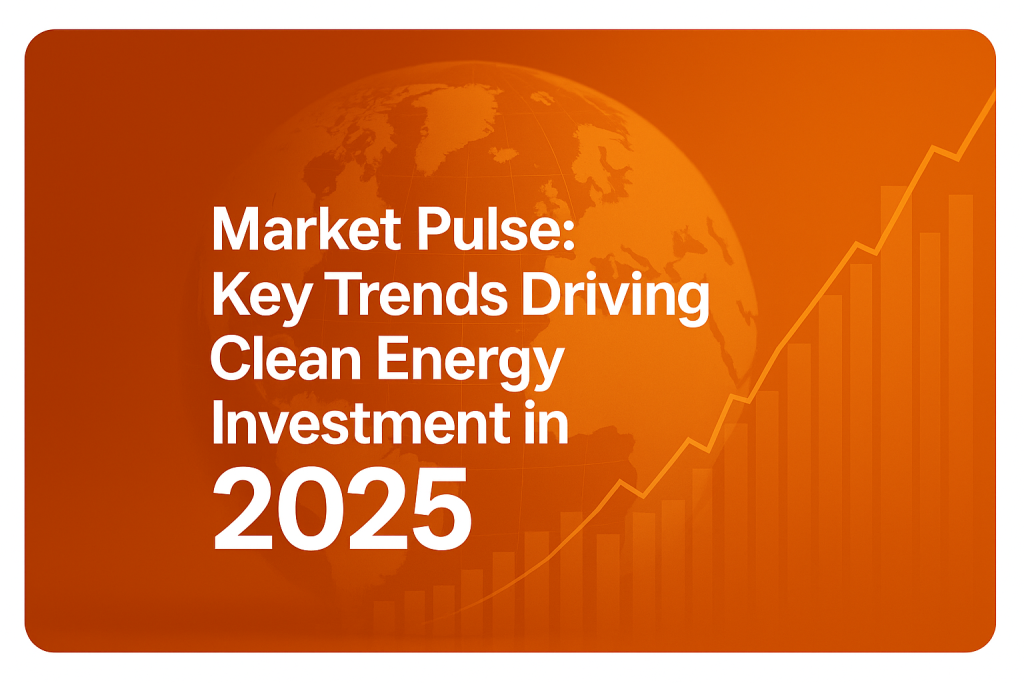
From policy shifts to technological breakthroughs, discover the macro trends that are shaping the clean energy sector—and where the smart capital is going next.
Clean energy is no longer a speculative sector—it’s a cornerstone of the modern
global economy. As we move deeper into 2025, the pace of innovation, regulatory
alignment, and investor momentum has reached an inflection point. At Bloodstone
International, we track these movements closely to ensure our partners are
positioned ahead of the curve.
Here’s a breakdown of the most powerful forces shaping the clean energy
investment landscape right now.
1. Policy Shifts Are Creating Certainty
Governments around the world are locking in long-term commitments to net-zero
targets, and that’s translating into real infrastructure spend. The U.S. Critical
Minerals Executive Order (March 2025) has triggered a wave of investment in
domestic extraction and refining projects. Meanwhile, the EU and UK continue to roll
out green incentive programs that de-risk renewable investment at scale.
For investors, this creates rare clarity: the direction of travel is defined—and backed
by legislation.
2. Grid-Scale Storage is the New Frontier
With renewables like wind and solar growing exponentially, the spotlight has now
shifted to how we store and distribute that energy. Advances in battery chemistries
(especially sodium-ion and solid-state) are making utility-scale storage more cost-
effective and bankable.
Investment is moving from generation to grid integration, opening new opportunities
for early participation in technologies that will define tomorrow’s energy systems.
3. Energy Security is Driving Localised Projects
From geopolitical tensions to fragile supply chains, the need for energy independence has never been clearer. Nations are investing in homegrown energy
projects not just to meet climate goals, but to insulate their economies from external shocks. Private capital is now supporting everything from regional solar parks to modular bioenergy systems, with strong community ties and long-term contracts.
4. Emerging Markets Are Ready for Scale
Sub-Saharan Africa, Southeast Asia, and parts of Latin America are poised for a clean energy leap—but need the capital. What’s changed? Improved risk-sharing frameworks, growing local expertise, and blended finance models are making these markets accessible to private investors looking for high-impact, frontier returns.
At Bloodstone, we believe these markets represent one of the most meaningful intersections between purpose and profit.
5. Institutional Interest Is Widening the Capital Base
Private equity firms, pension funds, and even sovereign wealth vehicles are accelerating their exposure to clean energy portfolios. As institutional interest deepens, valuation certainty and exit strategies are becoming clearer—giving early investors more confidence to deploy capital at earlier stages.
This rising tide of capital is lifting not just solar and wind, but adjacent sectors like sustainable materials, clean hydrogen, and circular waste-to-energy tech.
What This Means for Investors
Clean energy is no longer a sector. It’s a global engine of growth, innovation, and resilience. But the difference between passive exposure and active impact lies in how—and where—you invest.
At Bloodstone, we specialize in identifying high-yield, sustainability-driven opportunities aligned with these global trends. Our portfolio connects private capital with curated clean energy projects that offer both real-world impact and competitive returns.
Ready to align your capital with the future of energy?
Contact us for access to current opportunities.
Let me know if you'd like the **LinkedIn version** and graphic header as with the last article. Ready to go!
